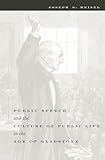Public speech and the culture of public life in the Age of Gladstone / Joseph S. Meisel.
Material type: TextPublication details: New York : Columbia University Press, c2001.Description: xiv, 382 p., [8] p. of plates : ill. ; 24 cmISBN:
TextPublication details: New York : Columbia University Press, c2001.Description: xiv, 382 p., [8] p. of plates : ill. ; 24 cmISBN: - 023112144X (acid-free paper)
- 9780231121446 (acid-free paper)
- Political oratory -- Great Britain -- History -- 19th century
- Gladstone, W. E. (William Ewart), 1809-1898 -- Oratory
- Great Britain -- Politics and government -- 1837-1901
- Oratory -- Great Britain -- History -- 19th century
- Great Britain -- Civilization -- 19th century
- Redes
- Politieke cultuur
- Maatschappij
- Politische Rede
- England
- 941.081 21
- DA560 M515p 2001
- 15.70
| Item type | Current library | Home library | Collection | Shelving location | Call number | Vol info | Copy number | Status | Date due | Barcode |
|---|---|---|---|---|---|---|---|---|---|---|
 Libro
Libro
|
Biblioteca Juan Bosch | Biblioteca Juan Bosch | Recursos Regionales | Recursos Regionales (2do. Piso) | DA560 M515p 2001 (Browse shelf(Opens below)) | 3 | 1 | Available | 00000094374 |
Based on the author's doctoral dissertation.
Includes bibliographical references (p. [341]-363) and index.
"By the last decades of the nineteenth century, more people were making more speeches to greater numbers in a wider variety of venues than at any previous time. This study argues that a recognizably modern public life was created in Victorian Britain largely through the instrumentality of public speech. Shedding new light on the careers of many of the most important figures of the Victorian era and beyond - including William E. Gladstone, Benjamin Disraeli, Sir Robert Peel, John Bright, Joseph Chamberlain, Winston Churchill, Lloyd George, Charles Haddon Spurgeon, and Canon Liddon - Joseph S. Meisel traces the ways in which oratory came to occupy a central position in the conception and practice of Victorian public life." "Meisel examines the public speeches made in three common arenas: Parliament, the pulpit, and the courtroom. Speech-making was essential to the practices of politics, religion, and law, and came to be the ultimate expression of their public promotion in the nineteenth century. By focusing on the act of public speaking itself rather than providing close analyses of particular "representative" speeches or sermons of the era, this work breaks new ground and demonstrates the value of approaching the history of British public life through oratory and its social contexts and practices."--Jacket.
Schools for Public Speaking -- The House of Commons -- Religion -- Law -- The Platform.


There are no comments on this title.